Kickstart your divine journey with 15 named angels in the Bible, uncovering their secrets and the roles they play in celestial tales.
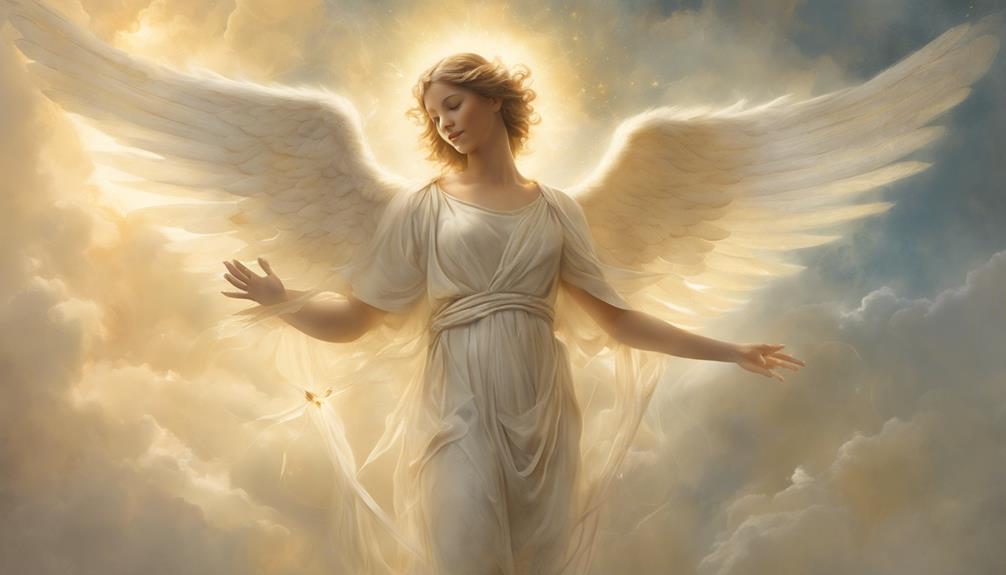
15 Angels in the Bible
Did you know that while there are countless angels mentioned in the Bible, only a few are named? Among them, figures like Gabriel, Michael, and Raphael stand out not just for their roles but for the deep symbolism and stories they carry.
You're about to embark on a journey through celestial realms where each named angel reveals unique aspects of divine intervention and cosmic battles. As we explore these beings, from messengers like Gabriel to enigmatic figures like Metatron, you'll uncover layers of spiritual insight and historical depth.
Wondering how these celestial beings influence human history and spiritual beliefs? Let's find out together.
Key Takeaways
- Gabriel is celebrated for his role as a divine messenger, particularly noted for the Annunciation.
- Michael stands out as the archetypal warrior angel, symbolizing protection and leadership in celestial battles.
- Raphael is recognized for his healing powers, focusing on both physical and emotional restoration.
- Lucifer's fall from grace highlights the consequences of pride and rebellion against divine authority.
Gabriel: Messenger of God
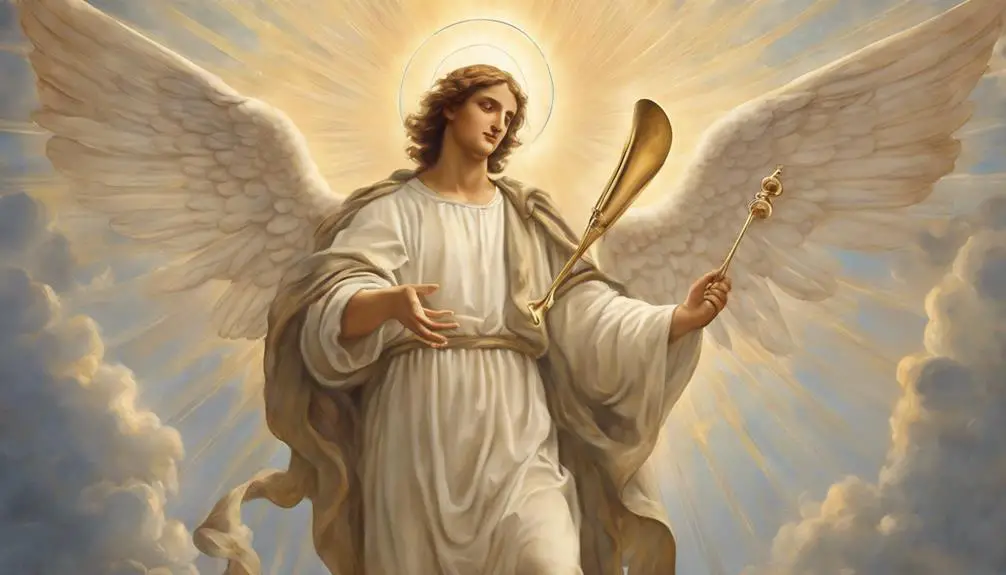
Gabriel, renowned as God's messenger, plays a pivotal role in biblical narratives, delivering divine messages to key figures with utmost precision and clarity. You must understand the Annunciation's significance, where Gabriel announced to Mary her role as the mother of Jesus. This moment isn't just a mere announcement; it's a pivotal event in Christian theology, symbolizing divine intervention in human history. Gabriel's role transcends mere messenger; he acts as a bridge between the divine and the human, bringing messages that alter the course of history.
Analyzing Gabriel's trumpet offers further insights into his importance. This trumpet isn't just a musical instrument; it symbolizes the voice of God, heralding significant events. In eschatological texts, Gabriel's trumpet signals the end of time and the resurrection, emphasizing his role in divine judgment and redemption. This aspect of Gabriel highlights his multifaceted role within biblical narratives, serving not only as a messenger but also as an agent of God's will, marking transitions between epochs with the sound of his trumpet. Understanding Gabriel's actions and symbols enriches your grasp of biblical themes, illustrating the complexity and depth of angelic intermediaries in divine communication.
Michael: Warrior Archangel
In biblical lore, Archangel Michael emerges as a formidable warrior, embodying the very essence of divine valor and protection. Unlike any other, his role within the angelic hierarchy is distinct, serving as a principal fighter, leading heavenly hosts against evil forces. His strategic battle tactics, deeply ingrained in scriptural narratives, demonstrate a mastery that transcends mere physical confrontations, delving into the realm of spiritual warfare.
Here are three key insights into Michael's significance:
- Leadership in Angelic Hierarchy: Michael stands at the pinnacle, orchestrating the forces of good with unmatched prowess. His leadership isn't only a testament to his strength but also to his unwavering commitment to the divine cause.
- Strategic Battle Tactics: His engagements aren't random skirmishes but carefully planned operations, showcasing a deep understanding of both heavenly and demonic strategies. This strategic approach ensures the forces of light remain several steps ahead of their adversaries.
- Symbol of Protection: Beyond the battlefield, Michael serves as a protector, embodying the hope and strength that guide believers through their darkest hours.
In essence, Archangel Michael's role is pivotal, blending might with strategy within the celestial order, thus ensuring the balance between good and evil is maintained.
Raphael: The Healing Angel

Among the celestial beings revered in biblical texts, Raphael stands out as the quintessential healer, whose interventions embody divine compassion and restoration. You'll find his narrative woven with healing miracles that not only address physical ailments but also facilitate spiritual recovery. Raphael's role is intricately linked with the concept of healing in its most holistic sense, suggesting a restoration that transcends the physical to encompass the emotional and spiritual realms.
Analyzing Raphael's actions, it's evident that his interventions are multifaceted, focusing on healing the body, mind, and spirit. This holistic approach underscores a profound understanding of human nature and the interconnectedness of our physical and spiritual well-being. Raphael's presence in scripture and apocryphal texts serves as a testament to the multifaceted nature of healing, inviting you to consider the balance between physical health and spiritual wellness.
Raphael's narrative encourages a deeper exploration of how healing miracles aren't just acts of curing physical illness but are deeply rooted in spiritual recovery. This perspective invites a scholarly examination of the angel's role as a mediator of divine healing, reinforcing the idea that true restoration involves a harmonious balance between the physical and the spiritual.
Uriel: The Light of God
While Raphael's narrative emphasizes healing, the story of Uriel, known as 'The Light of God,' invites you to explore the concept of enlightenment and divine wisdom as pivotal elements of spiritual well-being. Uriel's role in biblical and Apocryphal texts offers a unique lens through which to understand the multifaceted nature of angelic intervention in human affairs. Unlike other archangels, Uriel's presence is most notable in texts outside the canonical Bible, where his guidance often leads to significant revelations and deeper spiritual insight.
Here are three key aspects of Uriel's significance:
- Uriel's symbols: Often depicted with a book or a scroll, these symbols represent the wisdom and knowledge that Uriel imparts. This imagery underscores the angel's connection to enlightenment and the power of divine insight.
- Apocryphal texts: Uriel features prominently in these writings, serving as a guide to prophets and seekers. His appearances underscore the angel's role in imparting understanding beyond the immediate grasp of human intellect.
- The role of enlightenment: Uriel's interventions are designed not just to enlighten but to challenge and deepen one's spiritual journey, emphasizing the importance of internal growth and understanding.
Lucifer: The Fallen One
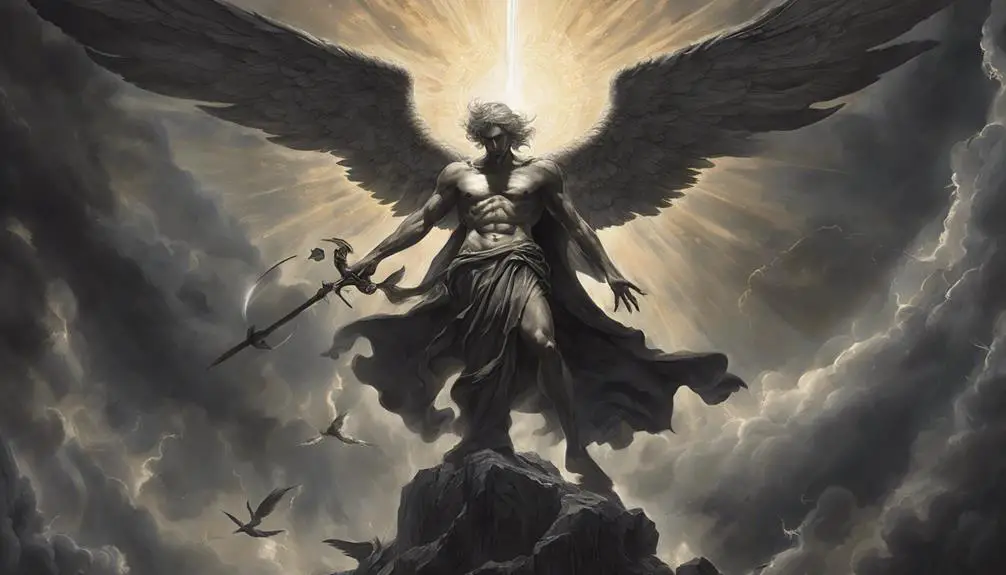
Lucifer's fall from grace, often depicted as the ultimate act of rebellion against divine authority, marks a pivotal moment in the narrative of celestial beings and their interactions with humanity. At the heart of this rebellion was Lucifer's pride, a flaw so profound it led to his ejection from the heavenly realms. You'll find that it wasn't just a simple act of defiance but a complex interplay of ego, desire for power, and the quest for autonomy that characterized Lucifer's downfall.
Analyzing the texts, it's evident that Lucifer's ambition to ascend above his creator was the tipping point. This wasn't merely a lapse in judgment but a calculated decision driven by an insatiable quest for supremacy. As a result, Lucifer transformed from a bearer of light to Hell's ruler, embodying the antithesis of his former glory.
This transition is crucial for understanding the dynamics of celestial rebellion and its implications for humanity. Lucifer's descent isn't just about the loss of divine favor; it's a narrative that underscores the consequences of unchecked pride and ambition. As Hell's ruler, Lucifer's ongoing influence is a testament to the profound impact of his fall, shaping the foundational beliefs surrounding good and evil in the Judeo-Christian tradition.
Abaddon: Angel of the Abyss
In the intricate tapestry of biblical narratives, Abaddon emerges as the formidable Angel of the Abyss, whose role and significance invite a nuanced exploration beyond mere surface-level understanding. You'll find that Abaddon isn't just a character in a story but a complex symbol woven into the fabric of apocalyptic literature, reflecting themes of judgment, destruction, and the dual nature of divine retribution and salvation.
To grasp the depth of Abaddon's role, consider these aspects:
- Abyss Origins: The term 'Abyss' in biblical literature often symbolizes chaos and the primordial state before creation, a place of punishment and confinement for demons. Abaddon, ruling over this realm, embodies the ultimate form of divine judgment, separating the irredeemable from the realm of the saved.
- Apocalyptic Roles: In apocalyptic texts, Abaddon plays a pivotal role as the overseer of the Abyss, unleashing judgments upon the earth. This aspect highlights the transformative power of divine wrath, intended to bring about a new order from the chaos of the old.
- Symbolism and Interpretation: Abaddon's depiction as both destroyer and potential redeemer invites a deeper reflection on the nature of divine justice, urging a reconsideration of the thin line between punishment and purification.
In understanding Abaddon, you're encouraged to dive deeper into the complexities of divine narratives, where destruction and salvation are often intertwined, revealing the multifaceted nature of biblical teachings.
Azrael: Angel of Death
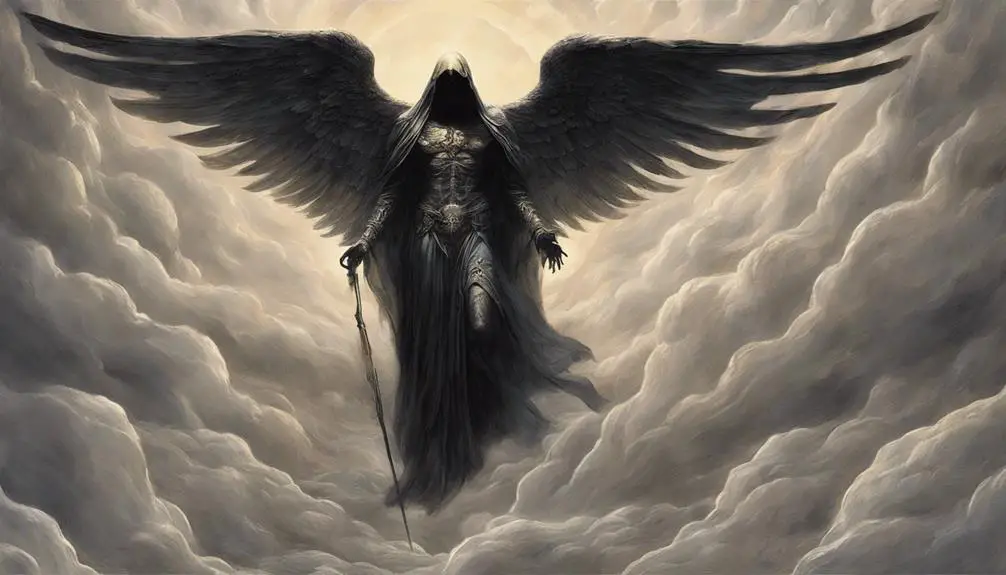
Exploring another facet of the celestial hierarchy, you'll now encounter Azrael, the Angel of Death, whose existence and duties offer a profound insight into the cycle of life and the afterlife within biblical texts. Azrael's roles are deeply intertwined with human perceptions of death, serving as a bridge between the mortal realm and the divine. His presence is often misinterpreted, shrouded in fear, yet in theological discourse, Azrael embodies a necessary transition rather than an end.
In analyzing Azrael's roles, you find he's not merely a harbinger of death but a compassionate guide for souls navigating the afterlife. His duties extend beyond taking lives; he also comforts the dying, ensuring their passage is devoid of loneliness and despair. This dual role challenges conventional death perceptions, presenting death as a nuanced journey rather than a final destination.
Scholarly interpretations suggest Azrael holds a meticulous account of souls, decreeing the time of death with divine accuracy. This precision underscores a theological assertion: every life and death serves a greater cosmic purpose, meticulously planned and executed by divine will. Through Azrael, the cycle of life is seen not as a series of random events but as a carefully orchestrated divine narrative, inviting a reevaluation of the fear and misunderstanding surrounding death.
Chamuel: Angel of Peace
Chamuel, often hailed as the Angel of Peace, plays a vital role in fostering serenity and understanding among individuals and nations within the biblical narrative. Diving into Chamuel's origins, one discovers that this angel's name means 'He who sees God,' a title that underscores the angel's profound connection to divine wisdom and insight. This celestial being is tasked with guiding souls towards peace, both within themselves and in their external relationships.
Chamuel's peaceful interventions are pivotal in the biblical context, where they serve not only as a mediator but also as a beacon of hope in times of turmoil. Here are three key aspects of Chamuel's role:
- Mediator of Divine Peace: Chamuel's interventions often come at times of great conflict, offering paths to reconciliation and understanding.
- Guide to Inner Serenity: Chamuel aids individuals in finding peace within themselves, encouraging a deep, introspective journey towards spiritual tranquility.
- Harbinger of Global Harmony: Beyond personal peace, Chamuel is envisioned as a champion for worldwide peace, inspiring leaders and nations towards cooperative, peaceful resolutions.
Through Chamuel's origins and peaceful interventions, we understand the angel's significant role in promoting peace on both a micro and macro scale, embodying the essence of divine serenity and harmony.
Jophiel: Beauty of God

Just as Chamuel embodies divine peace, Jophiel stands as a testament to the unparalleled beauty of God, guiding humanity to appreciate and cultivate beauty in all its forms. In religious texts and theological discussions, Jophiel is often associated with the illumination of wisdom that leads to an understanding of the divine beauty inherent in creation. This angel's role transcends mere aesthetics, touching on the spiritual symbolism of beauty as a pathway to connect with the divine.
Artistic representations of Jophiel frequently depict this angel with symbols of beauty and light, such as flowers or radiant light, underscoring the angel's association with enlightenment and intellectual beauty. These depictions not only serve as visual metaphors for Jophiel's divine mission but also as reminders of the angel's role in inspiring humanity to pursue beauty in their lives and surroundings. Analyzing these artistic renditions reveals a deeper layer of spiritual symbolism, where beauty becomes a bridge between the earthly and the divine, reflecting God's glory in the physical world.
In essence, Jophiel's presence in religious art and scripture highlights the profound belief that beauty, in all its forms, is a reflection of the divine and a source of spiritual inspiration and wisdom.
Zadkiel: Angel of Mercy
In the hierarchy of celestial beings, Zadkiel stands out as the embodiment of divine mercy, offering a profound understanding of forgiveness and compassion within the spiritual realm. This angel's role transcends mere mythology, embodying the essence of forgiveness symbolism and providing spiritual guidance to those seeking redemption and understanding. Zadkiel's presence in scriptural narratives emphasizes the multifaceted nature of mercy, highlighting its importance in the divine order.
Here are three aspects of Zadkiel's significance:
- Intercessor of Forgiveness: Zadkiel serves as a celestial mediator, advocating for humanity's capacity to forgive and be forgiven. This role underscores the belief that mercy isn't just a divine attribute but a virtue that humans are encouraged to emulate.
- Bearer of the Violet Flame: Symbolically, Zadkiel is often associated with the violet flame, a metaphor for the transformative power of forgiveness. This association emphasizes the angel's role in spiritual purification and the healing of emotional wounds.
- Guide in Spiritual Transformation: Through guidance and enlightenment, Zadkiel aids individuals in their journey towards spiritual growth, helping them to release past grievances and embrace a path of compassion and understanding.
Analyzing Zadkiel's role reveals a complex symbol of divine mercy, emphasizing the transformative power of forgiveness in spiritual enlightenment.
Raguel: Angel of Justice
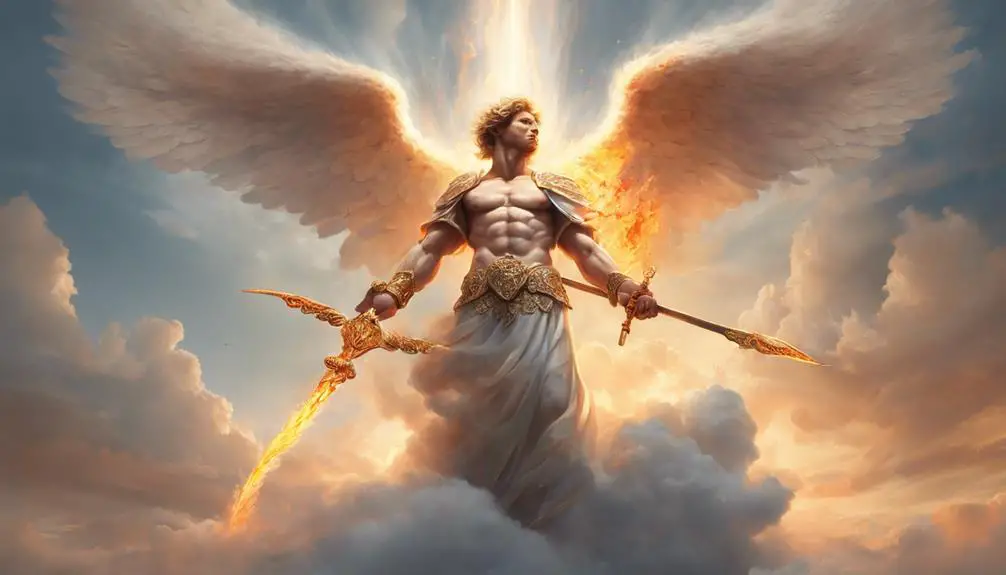
Among the hierarchy of celestial beings, Raguel stands prominently as the angel responsible for overseeing justice and fairness, ensuring that divine order is maintained throughout the universe. Unlike other angelic figures whose roles may encompass broader spiritual domains, Raguel's duties are explicitly centered around the administration of divine justice. This singular focus places Raguel in a unique position within the celestial order, acting as both a guardian of God's laws and an enforcer of celestial equilibrium.
Scriptural references to Raguel, while not abundant, provide insight into his critical function within the divine framework. These texts portray Raguel as a mediator, resolving disputes among angels and humans alike, and ensuring that transgressions against divine law are addressed appropriately. This role is crucial, as it upholds the balance and harmony essential to the functioning of both the heavenly and earthly realms.
Through the lens of theological scholarship, Raguel's existence and duties underscore a fundamental aspect of divine governance: the unwavering commitment to justice. This angelic being symbolizes the principle that justice isn't merely a human concern but a cosmic one, overseen by dedicated celestial entities like Raguel. His presence in the scriptures reinforces the belief in a just and ordered universe, governed by principles that transcend human understanding.
Sariel: God's Command
Turning our focus to another celestial figure, Sariel embodies the critical role of executing God's commands within the cosmic hierarchy. As you delve into the complexities of Sariel's roles, it's essential to understand how they fit into the broader angelic hierarchy. This understanding offers a nuanced perspective on divine order and Sariel's unique position within it.
Sariel, known for his strict adherence to divine will, plays pivotal roles that underscore his importance:
- Interpreter of God's will: Sariel serves as a bridge between the divine and the mortal, translating complex celestial decrees into understandable mandates for both humans and angels, ensuring the continuity of the divine plan.
- Guardian of knowledge: He holds the keys to secrets that are crucial for the spiritual advancement of humanity, acting as a custodian of divine wisdom and hidden knowledge.
- Enforcer of divine justice: Within the angelic hierarchy, Sariel is tasked with the solemn duty of enforcing divine justice, aligning with his role in executing God's commands with unwavering fidelity.
Through these roles, Sariel's contributions to the angelic hierarchy and the execution of divine will are both profound and indispensable, demonstrating the complexity and depth of angelic duties in the celestial order.
Remiel: Mercy of God
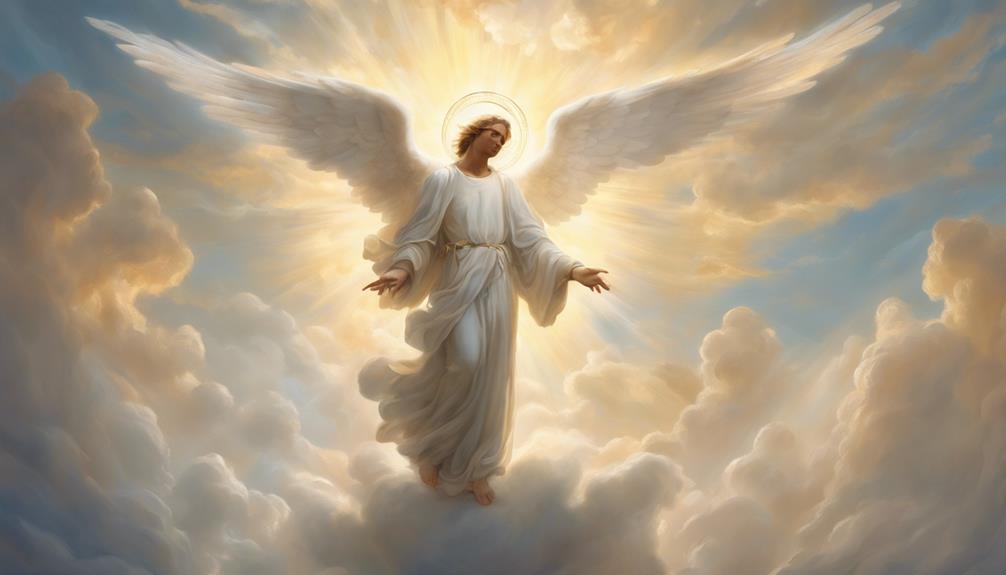
Several angels play pivotal roles within the celestial hierarchy, yet Remiel stands out for his embodiment of divine mercy, a fundamental aspect of God's interaction with humanity. Through Remiel, you're offered a unique lens to understand divine empathy and spiritual intercession, bridging the celestial and the terrestrial.
Remiel's role isn't just about conveying mercy; it's about embodying the very essence of understanding and compassion from a divine perspective. You'll find that he acts as a spiritual intercessor, mediating between the divine and human realms, ensuring that the mercy of God is accessible to those in need.
Aspect |
Description |
Impact on Humanity |
|---|---|---|
Divine Mercy |
Remiel's core attribute, reflecting God's compassion |
Provides hope and solace |
Empathy |
Understanding human suffering from a divine standpoint |
Fosters spiritual connection |
Intercession |
Mediating between God and humans |
Ensures mercy is accessible |
Guidance |
Offering direction towards redemption |
Aids in spiritual growth |
Through Remiel, you're reminded that divine empathy and spiritual intercession are not abstract concepts but tangible actions that have a profound impact on human life, guiding individuals towards understanding, forgiveness, and ultimately, redemption.
Metatron: Scribe of God
Metatron, often recognized as the Scribe of God, plays a pivotal role in the heavenly hierarchy by meticulously recording the deeds and events of humanity with unparalleled precision. This angelic figure isn't merely a celestial bureaucrat but embodies the profound bridge between the divine and the mortal, a testament to the transformational journey of Enoch into a higher being.
Understanding Metatron's significance offers a deeper comprehension of the celestial hierarchy and the divine's interaction with humanity. Here are three key aspects:
- Enoch's Transformation: Metatron's origin as Enoch, a mortal who walked with God and was transformed into an archangel, serves as a compelling narrative of divine elevation. This transformation underscores the potential for humans to transcend their earthly limitations.
- Celestial Hierarchy: As the Scribe of God, Metatron holds a unique position within the celestial hierarchy, acting as a principal communicator between the divine and the earthly realms. His role emphasizes the structured nature of the heavenly domain, where every entity has a distinct purpose.
- Divine Record-Keeping: Metatron's task of recording human deeds highlights the importance of accountability and the belief in a cosmic order where actions are noted and judged. This concept reinforces the notion of divine justice and the moral responsibilities of humanity.
Metatron's role as the Scribe of God, therefore, isn't only administrative but deeply symbolic, reflecting themes of transformation, order, and accountability within the celestial hierarchy.
Sandalphon: Brother of Metatron
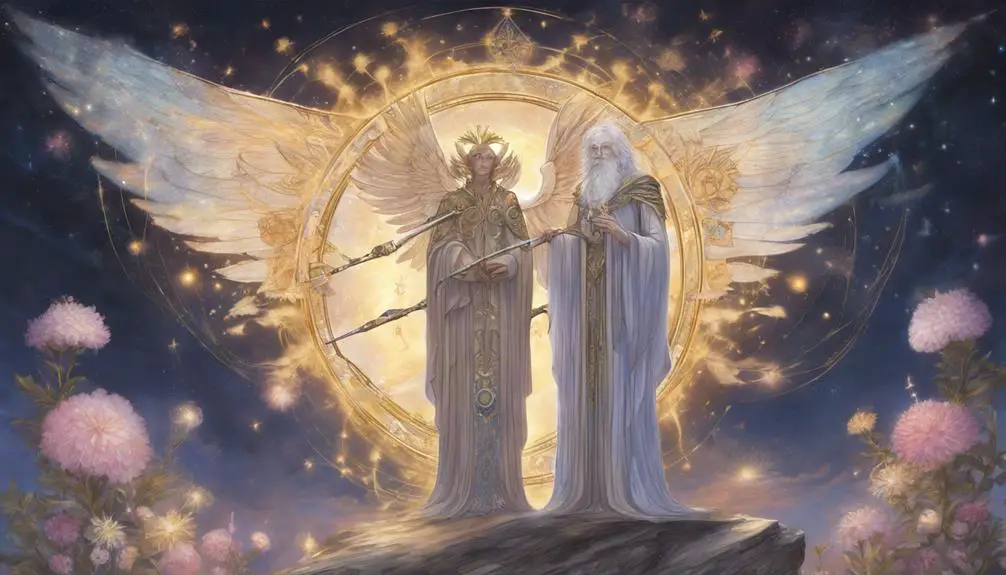
Sandalphon, recognized as Metatron's celestial sibling, plays a crucial role in the intricate tapestry of angelic hierarchy, embodying the bridge between prayer and divine response. His mystical origins weave through ancient texts, positioning him uniquely among spiritual beings. Unlike other angels whose existences are often shrouded in divine mystique, Sandalphon's narrative is richly layered, offering insights into his profound connection with humanity.
You'll find that Sandalphon's spiritual roles are multifaceted. He's depicted as a master of heavenly songs, using music to carry prayers from the earthly realm to the divine. This role underscores the belief in the power of prayer and the importance of intermediary beings in spiritual traditions. Sandalphon's presence reassures that human petitions are heard and valued in the celestial domain.
Moreover, his relationship with Metatron introduces a dynamic rarely seen among angelic figures. As brothers, they symbolize balance and duality within the spiritual hierarchy, each performing distinct functions that, when combined, facilitate a seamless flow of divine will and human aspiration.
Sandalphon's story, rich in mystical origins and spiritual roles, invites a deeper exploration of the connections between heaven and earth, emphasizing the importance of intermediaries in the spiritual journey.
Frequently Asked Questions
How Do Angels Interact With Humans According to Biblical Accounts Outside of the Named Archangels' Interventions?
In biblical accounts, angel appearances to humans often involve delivering messages, offering guidance, or providing protection. Your response to these encounters varies widely, from awe and fear to joy and worship.
These interactions, outside of those involving named archangels, show a profound connection between the divine and humanity. They highlight how angels serve as intermediaries, reinforcing faith and directing human actions according to divine will, showcasing a detailed and analytical perspective on celestial influence.
What Is the Significance of Angels Not Bearing Wings in Many Biblical Descriptions, Contrary to Popular Depictions?
You're seeing a contrast between historical texts and modern visuals because of artistic interpretation and cultural evolution.
In many ancient writings, angels aren't described with wings; this feature has been added over time. This discrepancy highlights how cultural and artistic norms shape our visual representation of spiritual entities.
It's a testament to how human understanding and depiction of the metaphysical realm evolve, blending theological concepts with the imaginative scope of art across ages.
Are There Any Biblical Accounts or Apocryphal Texts That Suggest Humans Can Become Angels After Death?
You might find it fascinating that 0% of canonical scriptures explicitly detail human transformation into the angelic hierarchy after death. This concept, while popular in modern narratives, lacks direct biblical or apocryphal endorsement.
Scholars argue that such ideas more likely stem from interpretations rather than textual evidence. It's crucial to differentiate between allegorical interpretations and what's explicitly stated, as the angelic hierarchy is distinct, with no clear pathway for humans to become angels post-mortem.
How Do the Roles and Characteristics of Angels in the Bible Compare to Their Portrayals in Other Religious Texts Outside of Christianity and Judaism?
When comparing divine messengers across various religious texts, you'll find intriguing mythological comparisons. In Christianity and Judaism, angels serve specific roles, guiding and protecting humanity.
However, in other faiths, these celestial beings might embody different characteristics or serve varied purposes, ranging from messengers of fate to warriors of the divine. Analyzing these portrayals offers a rich tapestry of beliefs and narratives that highlight both unique cultural perspectives and universal themes.
What Process, if Any, Does the Bible Describe for an Angel to Communicate With God or Receive Their Missions?
You're diving into how celestial messengers receive their directives without explicit biblical context.
The concept of an angel hierarchy suggests a structured order, possibly determining their access to divine visions or commands.
Although not described in detail, one might infer that angels communicate with the divine or receive missions through a form of spiritual intuition or direct revelation.
This process, while not explicitly outlined, hints at a complex, perhaps mystical, system of divine communication and governance.
Conclusion
In wrapping up our celestial inventory, it's ironic how these divine beings, from Gabriel's messages to Lucifer's fall, mirror humanity's complexity.
You've ventured through tales of warfare, healing, and enlightenment, yet the essence is strikingly human. These angels, embodying virtues and vices, suggest an ethereal reflection of our own struggles and aspirations.
It's fascinating how, in our quest to understand the divine, we uncover profound insights into our nature. Truly, in studying angels, we're dissecting aspects of ourselves.


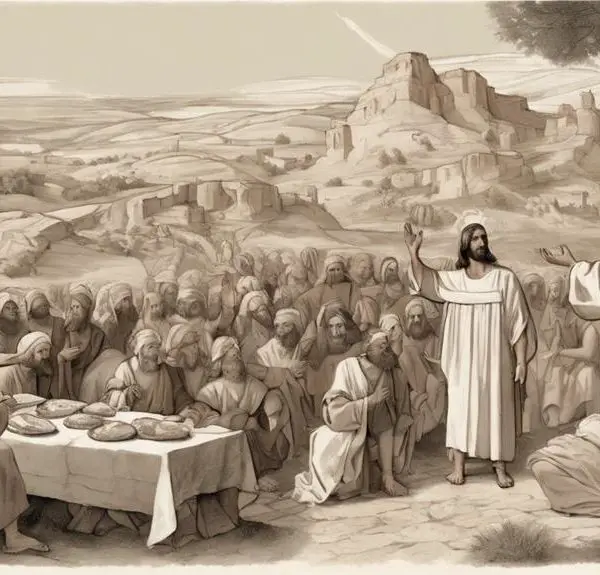
Sign up